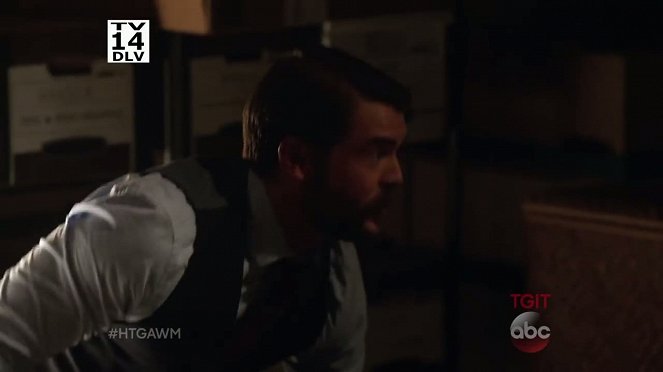Stoffentwicklung:
Peter NowalkMusik:
PhotekBesetzung:
Viola Davis, Billy Brown, Jack Falahee, Aja Naomi King, Matt McGorry, Karla Souza, Charlie Weber, Liza Weil, Conrad Ricamora, Alfred Enoch, Tom Verica (mehr)Staffel(6) / Folgen(90)
Inhalte(1)
Die hochintelligente Strafrechtsverteidigerin und Juraprofessorin Annalise Keating wird mit fünf ihrer Studenten in einen heiklen Mordfall verwickelt. (Netflix)
Kritiken (2)
Season 1 – 90% – Twists that have you holding your breath, a seemingly routine study or work environment presented in the most attractive way possible, and a gallery of amazing (Annalise, Wes, Bonnie, Rebecca) or at least sufficiently well-drawn and therefore entertaining (Frank, Connor, Laurel, Asher) characters. This time, Peter Nowalk, the creator of the series, is taking the lead for the Shondaland team, thus changing my genre perspective once again. There have been tons of courtroom dramas or detective thrillers, but it's not often that someone manages to shatter all expectations into pieces. How to Get Away with Murder only barely misses a full score because the period before the revelation narrowly outweighs the period after it. Nevertheless, the Keating Five is on a confident path. I can already feel the tension that will inevitably get thicker among the characters. Season 2 – 90% – More intense and devastating in the autumn portion than the previous season, and even more breathless in the spring. There are cases when a successful concept can be repeated (despite the fact that it is almost impossible nowadays to succeed a second time with the same concept without boring a hungry audience) and the creators, who so eagerly throw obstacles, crimes, blood, and betrayal at the main characters, have managed to do just that. Viola Davis gives a performance on the frontier of human capabilities, the remaining main characters form a more cohesive group, and when combined with the gradually revealed secret of a single night, this is the true definition of a series where the weekly wait for the next episode is cruel torture for the viewers. It is therefore a shame that the spring portion presents itself more as a space for uncovering important questions from the distant past, but when you combine that with the emotional torment of the plot, it ends up being more of a cosmetic flaw than the downfall of the entire series. You simply cannot help but get sucked into this whirlwind of events. Season 3 – 80% – The season that seemed to be heading towards a top rating ultimately falls short. And not because it was weaker, per se; it's just that some of the screenwriting flaws the series has had for quite some time have only now become more pronounced. And yet the tension never subsides, the autumn portion traditionally frays your nerves with every scene, and the key twist is so clever that nothing in recent television history can compare to it. What's more, reliable performers like Charlie Weber or Karla Souza get material that helps them hold their own next to the still unbeatable Viola without a hint of shame. It's just the way the whole puzzle is solved that keeps me up at night. Already last year, I sometimes felt that in the most extreme moments, the writers used the main characters not as living personalities, but only as storytelling devices. Because the audience has become so accustomed to all the twists, it is increasingly difficult to come up with something new. In my opinion, the finale suffers from the fact that it tries to provide answers to questions that I almost don't care about, and the key question marks are answered in ways that I didn't expect and didn't even want. However, I want to believe that this is not a permanent phenomenon and that the drop in rating is only temporary. Season 4 – 70% – Although the actors go all out and bring emotions even out of controversial storylines (Lahey senior, the dragged-out mystery surrounding Wes, the downright unsuccessful crossover), the overall impression is ever so slightly diminished. The unchanging premise, where the autumn portion raises a hundred and one questions, only to have the spring portion answer at most half of them and instead pile up even more questions, is somewhat frustrating for the legal drama genre. Of course, some storylines (Michaela, Bonnie) do not develop as I would like or as I would find logical, but I've already grown accustomed to the fact that the writers often use certain characters only as pawns and are always more concerned about twists than overall impressions. It's a game. A game that used to balance on the verge of perfection, and it saddens me that it gets less and less enjoyable to watch each year. Season 5 – 70% – A very strong start and then suddenly, in the end, a feeling that the spring portion of the season was again unnecessarily sad and oddly stretched out over seven episodes. Unfortunately, I cannot shake the feeling that the series will probably forever stagnate in the position of a masterfully escalating spectacle which, in the end, offers answers to questions that no one asked, or resolves seemingly desperate situations with a deus ex machina that could have arrived at any time before. It's a great shame, because Bonnie, Annalise, and Frank are still top-notch, and I tend to breathe for them in their most fervent moments this time around, but moving forward with over-the-top episodes or relationship moves back and forth isn't enough to satisfy me this time around either. Season 6 – 60% – The weakest score in the show's existence doesn't mean that the last season was the worst at all costs. Perhaps it's just that my patience has run out, and the way the writers, led by Pete Nowalk, decided to address the remaining question marks at the very end annoyed me pretty thoroughly. And I can't explain it without spoilers. I much resent the fact that for every mystery, even the most elaborately constructed, there is a pretty similar answer. If in the early days the universal motto was "It's always Wes!", in the later ones it would be "It's always Castillos!" – and it wouldn't even be that much of an exaggeration. I find the idea that someone from Laurel's family will always be behind all the criminal goings-on unfortunate, to say the least. But the fact that important decisions are made off-screen and the key people are characters we are meeting for the first time is nothing short of a disaster. Then I'm also chagrined at the long-running false lure of something that never comes. It was Nowalk, in an interview before the last series aired, who explicitly said that all the questions we as hungry viewers have ever had would be answered. Imagine my surprise, therefore, when that same person, just after the series ended, coincidentally addressed the very question marks that had always plagued me (what happened to Laurel's mother, what role Laurel herself played in it, and what the occasional allusions to her lifelong mental state were supposed to mean) by declaring that the audience would surely figure some things out for themselves. Whatever, we all have our theories, of course, but in a production that has always prided itself on the ingenious reveal of the story and the importance of even the slightest clue, such an approach is an unnecessary step backwards. The finale itself stirred up a lot of emotions in me, both positive ones (Connor's farewell to Oliver brought a fair amount of tears to my eyes, as does perhaps every major speech, be it in court or at a funeral) and negative ones (the decision to let two of my favorite characters die for the sake of what could almost be an homage to another work). Perhaps I'm blaming something that has been present in How to Get Away with Murder for a while; I simply expected the show to meet its audience halfway at the very end, not just in empty words but in the genuineness of the experience. On the other hand, if there has been a show in recent years that has thoroughly overturned the brain's convolutions on the subject of theories and relationships, it was the one about the legendary Annalise.
()
(weniger)
(mehr)
After the first three episodes, I wasn't particularly impressed by the series, but then things improved. The ending was even satisfying thanks to an interesting twist. However, I was left with a strange aftertaste after the first season. It seems to have become obligatory to watch two guys shove their tongues down each other’s throats in almost every movie or TV show as an anti-discrimination measure. I have nothing against homosexuals, as long as they don't touch me, but scenes like that don't exactly fill me with joy and happiness. What I also found annoying was that I saw some of the scenes 20 times due to the constant repetition. My memory is still working. This is why I only rate this series as average.
()

